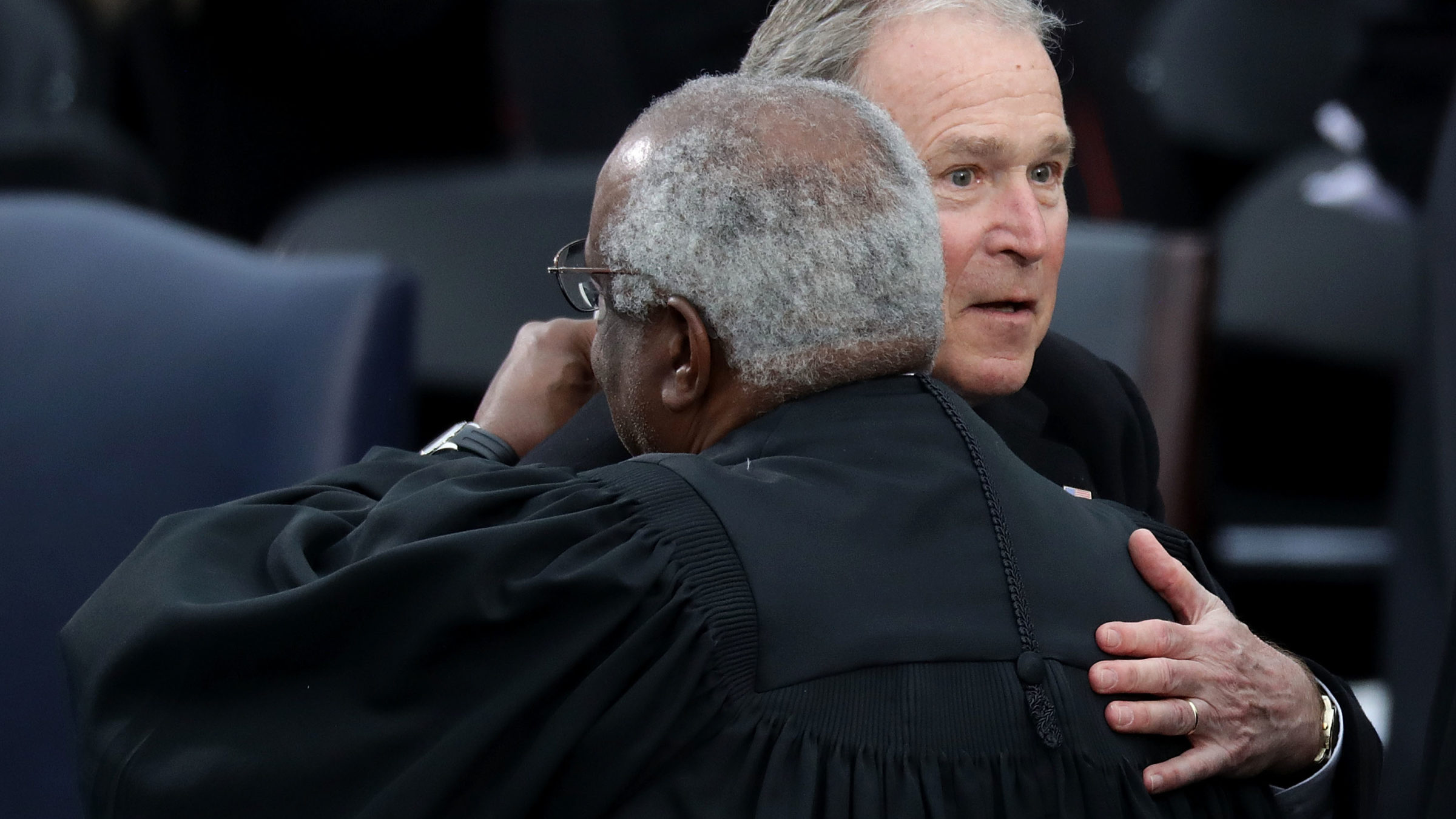With all of the awful details of Justice Samuel Alito’s leaked abortion opinion, there has not been enough time to focus on one of the worst: the casual way in which he smears supporters of abortion rights with the brush of eugenics. Alito is following in the footsteps of Justice Clarence Thomas, who in a 2019 concurring opinion argued that restrictions on abortion prevent abortion “from becoming a tool of modern-day eugenics.”
In his concurrence in Box v. Planned Parenthood, Thomas cited a book I wrote—Imbeciles: The Supreme Court, American Eugenics, and the Sterilization of Carrie Buck—along with an article I wrote about eugenics for Harvard Magazine. At the time, I wrote a response for The Atlantic pointing out that he had misused my research and was wrong about the abortion-eugenics link.
Well, here we go again. In footnote 41 of his leaked Dobbs v. Jackson Women’s Health Organization draft opinion, Alito cites friend-of-the-court briefs arguing that some “proponents of liberal access to abortion…have been motivated by a desire to suppress the size of the African American population.” Alito invokes Thomas’s concurrence in Box, and says “it is beyond dispute that Roe [v. Wade] has had that demographic effect,” since “a highly disproportionate percentage of aborted fetuses are black.”
The footnote does not use the word “eugenics”; Alito must have considered what a Molotov cocktail such a reference would be in an opinion of the Court. He does, however, cite a friend-of-the-court brief filed by a group of African American, Hispanic, Roman Catholic and Protestant Religious and Civil Rights Organizations, the first argument of which is as follows: “Abortion Grew Out of and Remains Rooted in Eugenics Ideology that Eliminates ‘Less Desirable’ Races and Certain Classes of People to Evolve a Superior Human Population.”

“Mr. President, let me tell you about this site called PragerU…” (Photo by Chip Somodevilla/Getty Images)
It’s perfectly clear why the Court’s right flank wants to claim that abortion rights are tied to eugenics: It allows them to polish up the anti-choice case with a trendy new argument. But this charge is as false in 2022 as it was in 2019. What’s more, Alito’s draft opinion itself contains a creepy line—about the “domestic supply of infants”—suggesting that he and Thomas doth protest too much, and that they are the ones with a troubling focus on birth demographics.
The main thrust of the argument is that in the early 20th century, some birth control advocates like Planned Parenthood founder Margaret Sanger supported both abortion and eugenics. That is true, but the sweeping conclusion Thomas and Alito draw from this information simply does not follow. This country was shaped by many people who believed in horrific things. The Electoral College was advocated for by people trying to protect slavery, and Congress restricted immigration in 1924 to keep out Jews and Italians, who were considered by many lawmakers to be racially inferior. Alito and Thomas would certainly not call for ending the Electoral College or modern immigration restrictions simply because long ago some of their supporters believed some bad things.
Alito ends footnote 41 by claiming not to “question the motives of either those who have supported and [sic] those who have opposed laws restricting abortions.” It’s a strange little qualifier, and unconvincing. If you do not believe there is a link between the subject matter of a Supreme Court case and one of the evilest movements of modern times—one that led to untold numbers of forced sterilizations and murders in Nazi Germany, the United States, and around the world—you do not bring it up.
It is a lie to say that today’s abortion movement is motivated by a desire to reduce Black births. Leaders of the abortion movement have been clear that their motivation is to empower women to control their own reproductive choices and lives. As NYU School of Law professor Melissa Murray noted last year, Black women were historically “especially vociferous in their desire for, and defense of, broader access to contraception and abortion.” Black civil rights groups today overwhelmingly support abortion rights. And Peggy Cooper Davis, also an NYU School of Law School professor, has written eloquently about the special importance of reproductive freedom to enslaved women, arguing that the Reconstruction Amendments help frame the abortion debate as part of their mission of liberating those who were once enslaved.
Setting aside Alito’s dishonesty for a moment, a troubling line in his draft opinion raises questions of its own. While arguing that the right protected by Roe is no longer necessary, Alito asserts that “a woman who puts her newborn up for adoption today has little reason to fear that the baby will not find a suitable home.” He elaborates in a footnote, saying that nearly 1 million women were seeking to adopt children in 2002 while—and here he grabs language from a 2008 Centers for Disease Control report—“the domestic supply of infants” available for adoption “had become virtually nonexistent.”
Many people have recoiled from that phrase “domestic supply of infants.” (“Consider the mind that would string those words together,” writer and uber-grammarian Benjamin Dreyer tweeted.) One of the reasons it is so troubling is that it treats decisions to give birth, and the actual birth of children, as a supply chain. Justice Alito may not be a eugenicist, but he is willing to invoke language from a government report that talks about births in the same clinically numerical way that eugenicists do. Alito’s language could be read as channeling the “Great Replacement” theory, a far-right idea that there is a plan to replace Americans with foreign babies. It is a concept that has no place in a discussion of abortion rights, which should focus on the rights of a person to privacy in their reproductive choices.
It’s not hard to figure out why Thomas began impugning the abortion movement with the charge of eugenics, and why Alito is doing so now. The old arguments that abortion stopped a beating heart, or that it interfered with God’s plan, are not persuading the public. Polls show that Americans overwhelmingly opposes overturning Roe.
Thomas and Alito and their fellow conservatives have come up with a trendier criticism: that abortion is racist, and that the modern pro-choice movement has invisible connections to American nativists and Nazis. It’s an ugly charge, and a false one. The conservative legal movement has a habit of doing just this: trying to back up their extremist new takes on the law with slapped-together history that does not stand up to scrutiny. Abortion is not about demographic battles over what kind of babies will populate the nation; it’s about a woman’s right to control her body. Talk of eugenics is not just wrong and offensive. It is a dangerous distraction.

